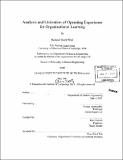Analysis and utilization of operating experience for organizational learning
Author(s)
Weil, Richard Scott, 1976-
DownloadFull printable version (25.56Mb)
Other Contributors
Massachusetts Institute of Technology. Dept. of Nuclear Engineering.
Advisor
George Apostolakis.
Terms of use
Metadata
Show full item recordAbstract
The objective of this thesis is to clarify the ways that organizational factors influence nuclear power plant performance in order to improve performance. Therefore, this thesis studied the nuclear power plant organizational environment by identifying and detailing its important work processes. These work processes are: the Work Request Work Process; the Condition Reporting Work Process; the External Operating Experience Work Process; the Design Change Process; and the Procedure Change Work Process. Using this information, a methodology of incident investigation that targets organizational deficiencies contributing to events was developed. Using this methodology to analyze recent significant incidents, a list of important organizational factors and the context within which they influence the successful completion of tasks was identified. These factors and the context within which they influence performance are: 1) Communication-Pervasive-Most important between different units and departments; 2) Formalization-Execution; 3) Goal Prioritization-Prioritization; 4) Problem Identification-Planning, scheduling, and return to normal line-up; 5) Roles and Responsibilities-Execution; and 6) Technical Knowledge (job specific knowledge and broad based knowledge)-Job specific knowledge-execution/Broad based knowledge -prioritization, planning, scheduling, and other tasks. Although safety culture and organizational learning are not listed, they are important. (cont.) The reason for their exclusion was that they are not single organizational factors useful when cited in incident investigations. Rather, safety culture is a term used to describe all organizational factors, including organizational structure that impact performance. Similarly, organizational learning was excluded because it is a collection of programs, processes, individual attitudes and culture responsible for learning. Although organizational learning was not listed, it was studied resulting in the development of the Utilization of Operating Experience Work Process. The Utilization of Operating Experience Work Process consists of the following seven steps: 1) Identification; 2) Screening/Prioritization/Dissemination; 3) Investigation/Evaluation; 4) Development; 5) Implementation; 6) Closeout; and 7) Verification/Validation. Since prioritization was identified as important in the above work process and the analysis of significant events, a methodology for the prioritization of work activities at nuclear power plants was developed. This methodology produces a prioritization tool that assigns a numerical performance index to each item requiring prioritization is developed. Applying the methodology at Seabrook Station produced a tool that allowed those who prioritize external operating experience to more efficiently and accurately prioritize. In addition to the success of the application at Seabrook, a workshop held at MIT with experts in prioritizing external operating experience who further validated the methodology and the resulting tool.
Description
Thesis (Ph. D.)--Massachusetts Institute of Technology, Dept. of Nuclear Engineering, 2001. Includes bibliographical references.
Date issued
2001Department
Massachusetts Institute of Technology. Department of Nuclear Engineering; Massachusetts Institute of Technology. Department of Nuclear Science and EngineeringPublisher
Massachusetts Institute of Technology
Keywords
Nuclear Engineering.